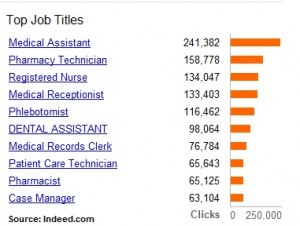Not that long ago, all the buzz in healthcare was about the nursing shortage. Hospitals, skilled care facilities, medical offices, not to mention those other providers we don’t generally think of — insurers and public health centers among them; it seems everyone was hunting nurses.
Today, the nursing shortage has eased, and so have billings. To be sure, experienced nurses with special skills are still in demand, and recruiters who have developed an expertise in filling these niches are doing well. So are agencies working in parts of the country where supply is more limited.
For everyone else, take heart. There’s still plenty of business elsewhere in healthcare. As a whole, the industry is expanding rapidly with demand for professionals and skilled workers (and even entry-level) approaching record levels.
In the 12 months from January 2011 to January 2012, the healthcare industry added 312,500 jobs. That’s almost a sixth of all the new jobs the economy created. Hospitals alone accounted for some 96,000 of the new healthcare jobs. The number of jobs in physician offices — and that includes positions from receptionist, to billers, records clerks, physician assistants, technicians, patient counselors — grew by almost 65,000.
Indeed, the job search engine, reports that in one year — from February 2011 to February this year — the number of job listings for healthcare workers rose 21%. That’s one of the largest increases of the 13 sectors Indeed tracks. If percentages don’t impress you, consider this: In February Indeed counted 700,000 jobs in healthcare. Retail, which was second in total listings, had less than half that.
 Topping the list of openings are medical assistant jobs. There were 241,382 listings for them on Indeed in February. Also among the top 10: pharmacy tech, receptionist, clerks, and phlebotomist.
Topping the list of openings are medical assistant jobs. There were 241,382 listings for them on Indeed in February. Also among the top 10: pharmacy tech, receptionist, clerks, and phlebotomist.
While hiring is keen across the board, one overlooked area is beginning see the early signs of a candidate shortage, at just the same time demand is poised to take off.
Healthcare management positions are expanding and the need is only going to going to grow for all the same reasons that healthcare generally is growing. More managers are needed to supervise growing staffs to care for the aging U.S. population, and to prepare for the influx of new patients that will be covered when the federal health insurance program takes full effect in a couple of years.
The industry is well aware of those twin issue. Less well known is the impending retirement of senior and mid-level managers, many of whom are in their 50s and 60s. At the same time, while colleges and universities are expanding their healthcare degree programs, fewer than 70 made the U.S. News list of graduate programs in healthcare management. Fewer still have nursing or medical schools making it almost impossible to earn a dual degree.
Two years ago CNN/Money’s Top Jobs list ranked hospital administrator positions 36th on its list of 100 best and in-demand jobs. The median salary in the CNN report for an experienced administrator was $98,000. More senior positions command far higher salaries. According to CBSalary.com these executive positions pay an average of $414,390, with the top 25% earning over $549,634.
Physician managers especially are in short supply. And doctors with computer science backgrounds are so few they can all but name their salary.
However, even more modest management positions are seeing salaries rise as the competition grows keener. Where these jobs were traditionally sourced from print or online job postings, it’s not unusual now for contingent recruiters to get the req. Most are still being filled via referral or job posting, but the trend toward professional recruiters is almost certainly going to accelerate.
The Bureau of Labor Statistics offers this list of salaries for managers in specialty practices: $54,314 in gastroenterology; $54,201 in dermatology; $58,899 in cardiology; $48,793 in ophthalmology; $44,910 in obstetrics and gynecology; $51,263 in orthopedics; $51,466 in pediatrics; $48,814 in internal medicine; and $47,152 in family practice.
Naturally, the top pay goes to the most experienced professionals. However, even first-time manager salaries are increasing, as the industry recognizes the impending shortage of administrators.
At the entry-level, experience in the specific area is the number one requirement. To move up the ladder, business administration, finance or similar higher-level coursework is not only desirable, but a requirement of many employers. For the more senior positions, an MBA or advanced degree in hospital management is indispensable.
Women are especially in demand, as hospital administration has been a typically male-dominated industry.
“The majority of top management positions in healthcare administration are held by men, even though women outnumber men in the profession,” note the authors of one study of the gender disparity. Since that article was written, recruitment efforts by schools and employers have increased the number of women in administrative and managerial positions. At Johns Hopkins School of Public Health, female students outnumber their male counterparts by two-to-one.
Nursing placements have been a lucrative specialty for many agencies over the last decade. Looking ahead, it’s management positions that will become the next field of battle in the talent war. If healthcare is your bread and butter, it might well be time to start developing your administrative talent pipeline so you can move quickly once the job orders start arriving. Plus, having a ready pool of administrative talent can be one of your strong selling points for hospitals and other large facilities.
